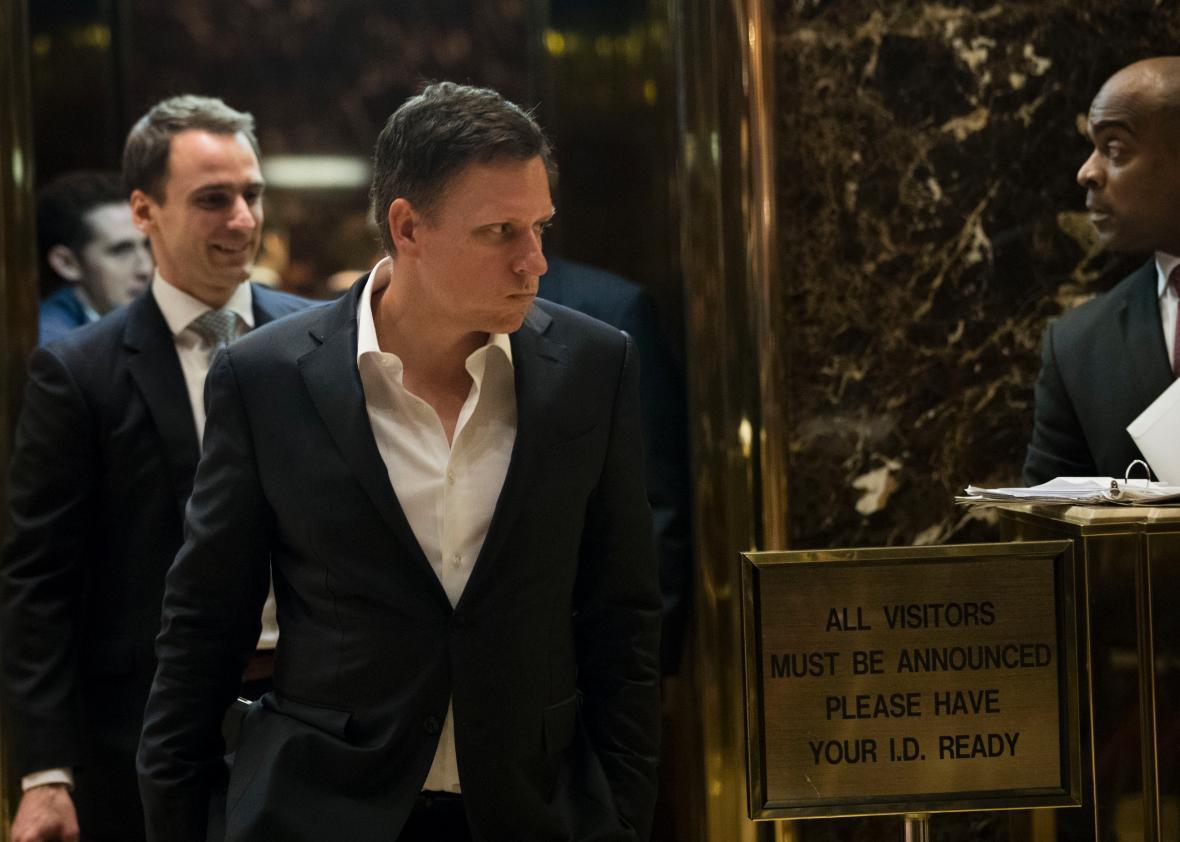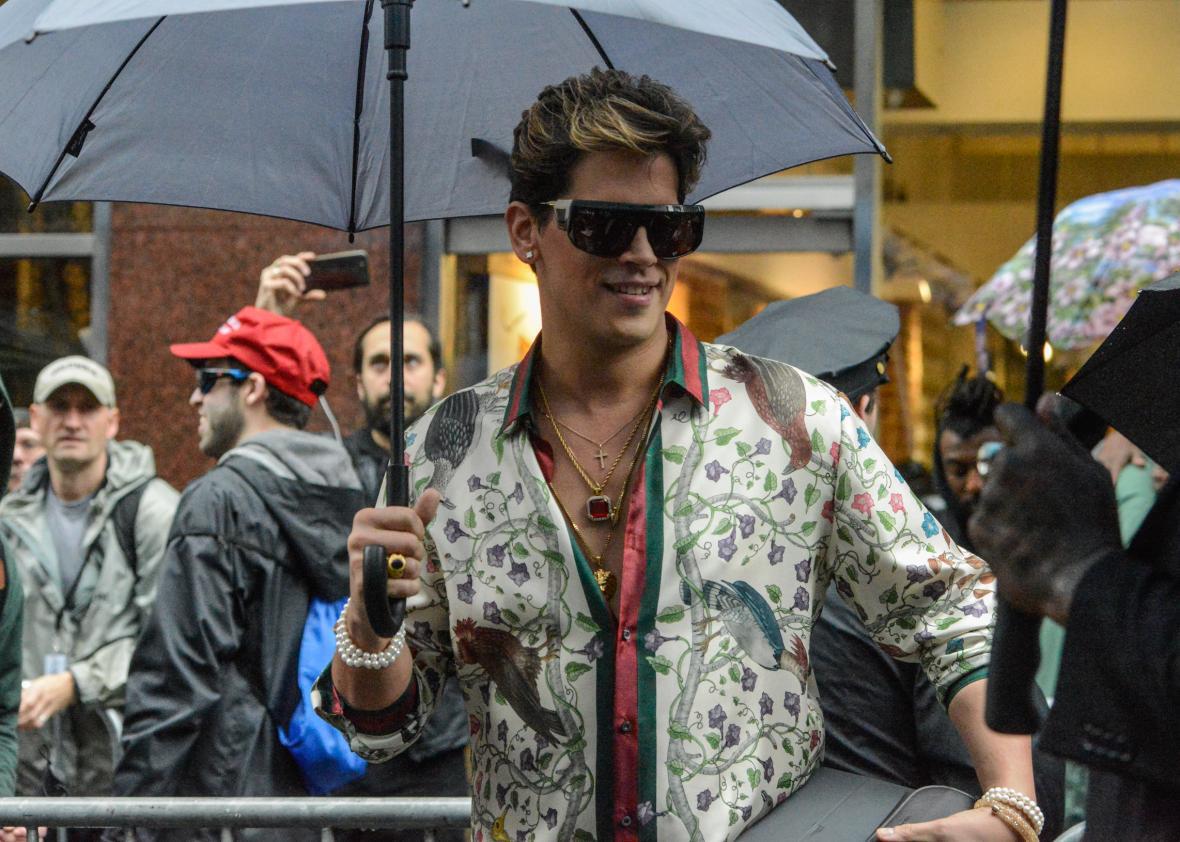Say what you will about 2016—that it was a reeking dumpster fire, maybe, or a malfunctioning computer that needed to be turned off and rebooted—but the year thrust a few magnificent villains into the spotlight. There was Peter Thiel, a dead-eyed billionaire who called his bid to a help a racist millionaire destroy a news outlet “philanthropic,” and who didn’t exactly not say he’d suck teen blood for immortality. We also got Milo Yiannopoulos, a Nazi-sympathizing bizarro Ken doll with a British accent and a talent for turning the internet’s latent undercurrents of hate into waves of violent threats.
These men are more than just bad actors on the national stage: They seek influence and use it for evil means, then show no remorse. They are comic book–level villains. And they also happen to be two of the most visible gay men in America.
Neither Thiel’s gayness nor Yiannopoulos’ are incidental to their rise to infamy. “Dangerous Faggot” is Yiannopoulos’ preferred moniker and the name of his controversy-ridden campus speaking tour. PayPal co-founder Thiel was barely known outside Silicon Valley until he funneled millions of dollars into Hulk Hogan’s lawsuit against Gawker, which successfully sunk the news site. He had no connection to Hogan, a known homophobe. But Gawker had once written a blog post about Thiel’s sexuality, and though Thiel was already out at the time, he claimed to be a “victim” of the site’s “bullying.” In other words, his fame stemmed directly from his sexuality. These men are not closeted or quietly gay homosexuals: They are here, they are queer, and they would probably object to my use of that term, associated as it is with the kind of pan-LGBTQ identity politics both despise.
And yet, these gay villains were called upon to foreground their queerdom in their shared fight to elect Donald Trump. Each had his part to play. Yiannopoulos further inflamed the festering staph infection that is Breitbart News and helped equate racist, sexist, and xenophobic harassment with acceptable public discourse. Thiel poured at least $1.25 million into Trump’s campaign and spoke in Trump’s support at the Republican National Convention. In that address, Thiel both highlighted and downplayed his quasi-historic speaking slot. “I am proud to be gay,” Thiel said. But also, LGBTQ rights are the focus of “fake culture wars” that “only distract us from our economic decline.”

Drew Angerer/Getty Images
Yiannopoulos, meanwhile, became a go-to voice of the alt-right, which helped make white men scared for their own supremacy. He encouraged them get their anger out by bashing black actresses just for being black and female, and by voting for a man who seemed to hate women and immigrants as much as they did. Because he is gay, Yiannopoulos was able to appoint himself a “leather-clad, popper-sniffing best friend” who gives straight bigots permission to call progressive queer people faggots and use the phrase that’s so gay as an insult. Thiel and Yiannopoulos are palatable to the right wing because they’re white, male, and ideological extremists, but their villainy is enhanced, not mitigated, by their queerness. Their endorsement of a party that works at every turn to impede the rights of LGBTQ people allows straight conservatives to badmouth queers and feel justified because a gay told them it was OK.
When Harvey Milk implored fellow gays in 1978 to “come out,” he argued that gay visibility would “break down the myths” and “destroy the lies and distortions” that undergird homophobic discrimination and violence. People who don’t think they know any gay people find it easier to believe in a monolithic queerness that rests on stereotypes of amorality and sexual predation, the argument went. Such overtly hostile myths about gay people have dissipated a bit (at least for white and cisgender queers), but coming out in public is still a powerful way to add further humanity and depth to the mainstream understanding of queer life. Every time a person comes out, the public definition of queerness expands.
Queer representation in pop culture, though still sparse, is more widespread and diverse than it’s ever been. We’ve got old-school butch Lea DeLaria acting alongside sexy newcomer Samira Wiley on a hit Netflix show in its fifth season, a Best Picture–winning depiction of the developing identity of one black gay man, and a genderqueer showrunner producing a series that’s cast more transgender actors than we’ve ever had the privilege of watching onscreen. These famous LGBTQ faces, along with political trailblazers like Sarah McBride and Tammy Baldwin, have broadened the multiplicity of visible queer lives in America, giving members of the general public more data points to incorporate into their internal sketches of what a queer person is in 2017.
Gay villains serve a related purpose. Within the queer world, villains like Yiannopoulos and Thiel—and Caitlyn Jenner, another famous Trump supporter who has graciously excused the actions of transphobes on behalf of the LGBTQ community—are fantastic reminders of the ugliness that lies within our ranks, hidden by rainbow flags and an equality narrative based on love. Queers have staged protests at several recent Pride celebrations, demanding an end to the involvement of war profiteers, corporations that fund private prisons and oil pipelines, and police forces that disproportionately kill and harass LGBTQ people of color. They have been met with scorn and indignation from gay people who say the protests are too divisive and disruptive of a celebratory event. AIDS activist Mark S. King and famed ACT UP veteran Peter Staley have issued smart responses to those critiques, noting that a large segment of gays in the ‘80s resented ACT UP for being loud and inconvenient instead of acquiescing to respectability politics. Now, ACT UP activists are widely revered as heroes.
All of which is to say: The community is already divided, and everyone under the LGBTQ umbrella doesn’t belong in the same political tent. There are gays who would rather cheer on cops and corporations than support their fellow queers in valid protest. There are gays who would rather safeguard their billion-dollar fortunes and embrace an admitted sexual predator than pick up the mantle of LGBTQ equality. There are gays who feel more affinity with straight, homophobic racists than with other gays.
The elevated public profiles of Yiannopoulos and Thiel have inspired difficult intra-community conversations that might not have otherwise arisen. When Out magazine gave Yiannopoulos a silly photoshoot and fluffy profile treatment last September, members of the LGBTQ media (including two Slate staffers) signed a petition opposing “those who would sell out the community to promote … toxicity for clicks and profits.” When he said that lesbians are “just needing a good dicking,” he brought the misogyny that’s often excused in gay male communities into bright daylight. When Thiel asked “Who cares?” about transgender bathroom access—it’s “a distraction from our real problems,” he said—it prompted some queers to question who gets included and who gets left out when prominent gays refer to the collective “we,” “us,” and “our.” Thiel may be more visible and easily reviled than most contemporary gays, but his anti-trans views are echoed by smaller-time villains, like executive producers of Pride celebrations, in our midst. Seeing evil gays on our TV screens makes it easier to believe that the threat doesn’t just come from the likes of Mike Pence and Pat McCrory. Sometimes, the call is coming from inside the house.
This is a good lesson for straights to learn, too. I have long believed that women will not have achieved full gender equality until we make up half the world’s mass murderers and sex offenders. (Not that I would advocate for more mass murderers and sex offenders, but I do wish, kind of, that women made up a greater share.) If people believed women to be capable of terrible violence, they might believe us to be capable of everything else—the presidency, for instance. Visible gay villains teach the world that queers aren’t all lovable Ellen DeGenereses, glamorous Laverne Coxes, sharp-witted Anderson Coopers, and goofy Neil Patrick Harrises. Equality means having the freedom and power to be just as fucked up and insufferable as anyone else.
